Among several areas of growing collaboration, Canberra’s militarized immigration policy arguably inspires London the most, write Antony Loewenstein and Peter Cronau.
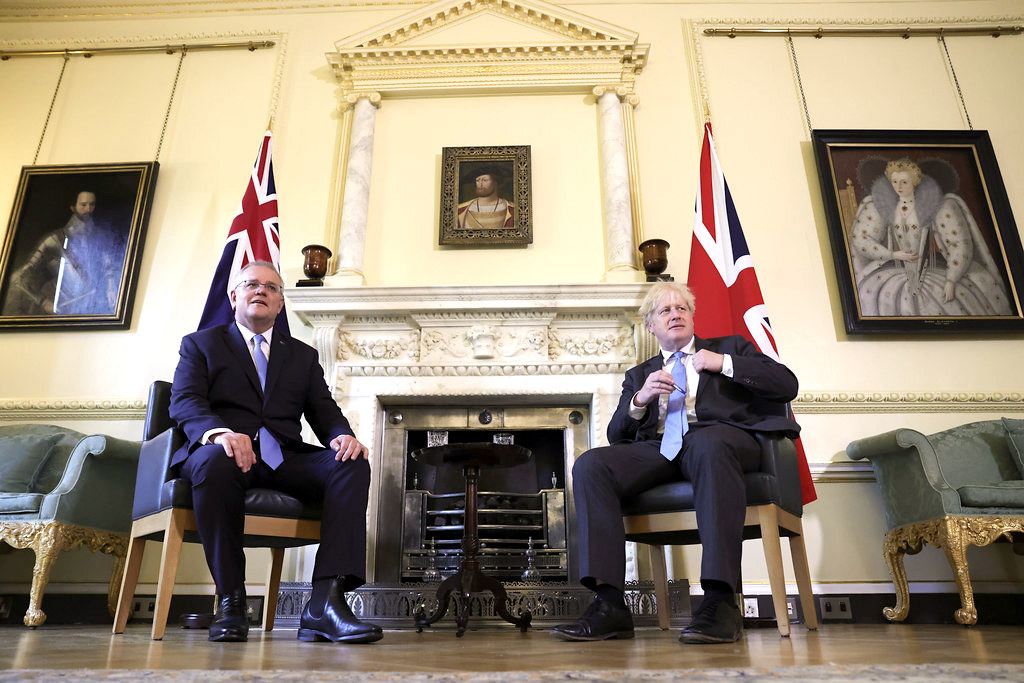
Australian Prime Minister Scott Morrison, left, meeting with U.K. Prime Minister Boris Johnson in London in June. (Andrew Parsons, No 10 Downing)
By Antony Loewenstein and Peter Cronau
in Sydney, Australia
Declassified UK

 Australia’s independence from Britain has been contested ground since the nation’s birth in 1901 — the first real test being Australia’s decision to send troops to Europe for Britain’s war with Germany in 1914.
Australia’s independence from Britain has been contested ground since the nation’s birth in 1901 — the first real test being Australia’s decision to send troops to Europe for Britain’s war with Germany in 1914.
Two bitterly fought referenda to allow military conscription were narrowly defeated — Australia’s contribution to the Great War was to remain a voluntary one.
Move forward to 2021 and the relationship is no less controversial. U.K. Prime Minister Boris Johnson and U.S. President Joe Biden announced a new Indo-Pacific military alliance with Australian Prime Minister Scott Morrison in September and awkwardly titled it AUKUS (which as one nave noted, sounds better than USUKA).
In announcing AUKUS, the three leaders loftily claimed to be “guided by our enduring ideals and shared commitment to the international rules-based order.”
The U.K. in July signaled its re-emergence as a Pacific Ocean force when it announced the aircraft carrier HMS Queen Elizabeth would lead a fleet of U.K. navy ships to join with the U.S. Navy in leading a flotilla of warships including Australian and Japanese vessels through the South China Sea.
The Australian Defence Department would neither confirm nor deny the precise nature of the maritime exercise. However, on this occasion the fleet kept a wary distance from Chinese-claimed territory.
The U.S. may brandish the world’s most powerful military but it is turning towards its traditional friends as it readies for confrontation, and perhaps conflict, with the rising economic and military powerhouse of China.
The AUKUS treaty saw Australia spectacularly dump its $90 billion contract with France to build Australia’s new submarine fleet, instead announcing a deal to buy U.S. and U.K. technology and build nuclear-powered submarines in Australia.
Although not nuclear armed (yet), the first of the new nuclear submarines will not be ready until as late as 2040. Other elements of the treaty, however, will come into play much sooner. Australia will spend $30 billion on new weaponry, including a suite of long-range missiles for its navy and air force, as well as land-based precision strike missiles, largely sourced or developed in conjunction with the U.K. and U.S.
Britain’s resurgent interest in the Pacific region as a part of its “increased international activism” was announced in March with Johnson stating the strategy will “tilt to the Indo-Pacific, increasingly the geopolitical centre of the world.”
Together with the U.S. “pivot to Asia” outlined by U.S. President Barack Obama in 2011, Australia is becoming a focus of a rapid military build-up.
Australia is in a precarious position as the “tilt” and “pivot” of these major powers’ international activism plays out on the strategic balance in the Indo-Pacific. Australia is hoping it is more than a mere “suitable piece of real estate” adrift in the South Pacific.
The world may have got some insight into the true closeness of the new AUKUS relationship when in a September press conference Boris Johnson referred to Scott Morrison as “prime minister Morris” and Biden forgot his name entirely, referring to him instead as “uh, that fella down under.”
Joint Work on New Weapons
In the 1950s and 60s Britain convinced Canberra to allow it to test its prototype nuclear bombs in South Australia. With a nuclear ascendant U.S., Britain was racing to keep a seat at the nuclear table. Australia on the other hand was hoping that helping Britain would ensure them a “nuclear guarantee”.
Described as safe, the bombs’ fallout from the Maralinga and Emu Field tests contaminated livestock and humans, and fallout carried by winds was detected as far away as Sydney, Brisbane and Adelaide.
British disinterest saw a Royal Commission in 1985 that led to Australia embarrassing the U.K. into helping fund an attempted clean-up of the sites, with works ending in 2000.
As well as nuclear weapons testing, the Australian desert lands of the Anangu indigenous peoples have for 60 years also hosted other weapons development projects, rocket firings and missile tests at the RAAF Woomera Range Complex, near Maralinga.
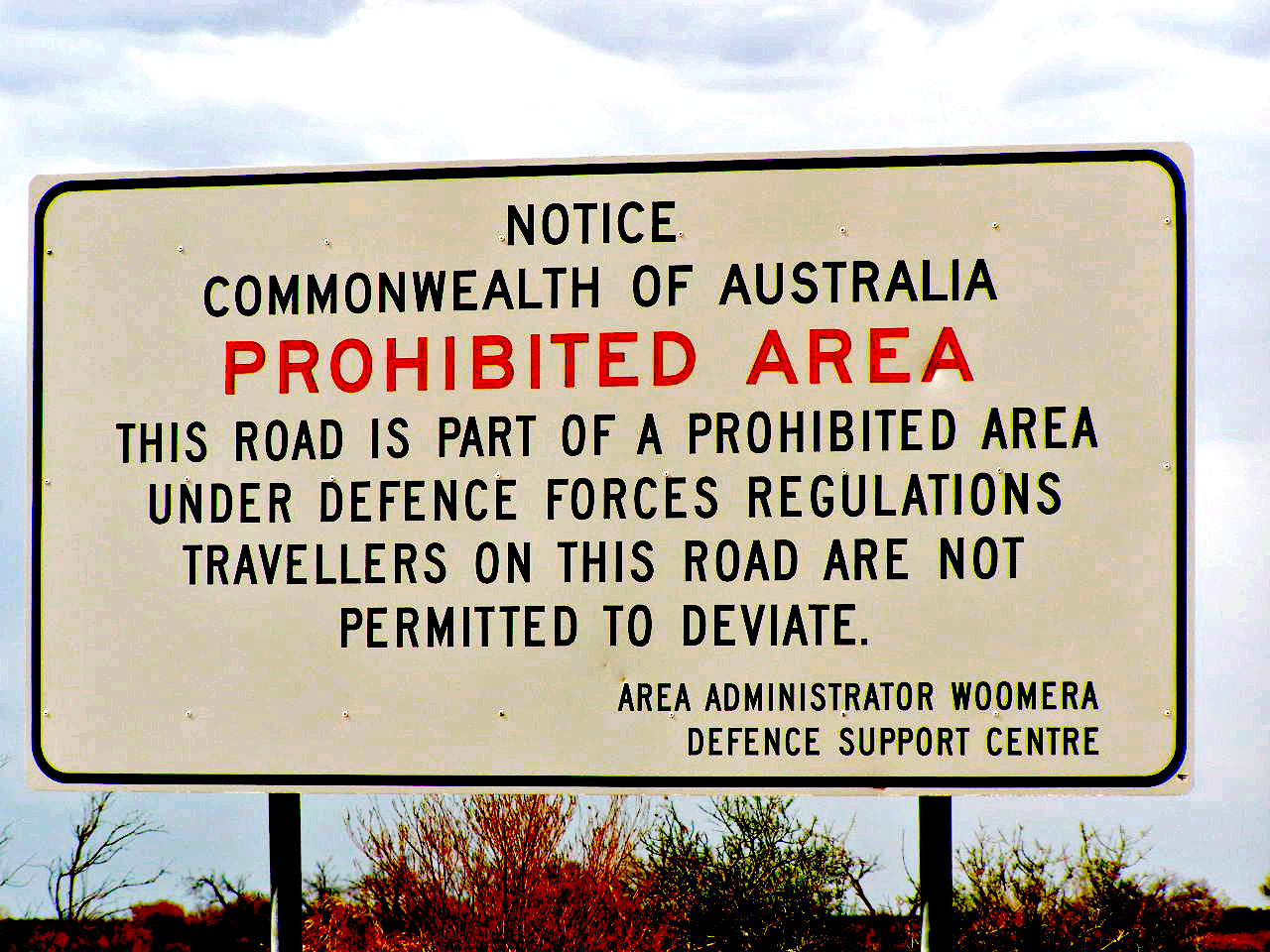
Warning sign on Stuart Highway, which passes through the Woomera Prohibited Area, South Australia, 2007. (Kr.afol, CC BY-SA 3.0, Wikimedia Commons)
It was only in 1994 that the Anangu received compensation for injury and damages of the nuclear testing.
Both Britain and the U.S. are now working on new generation nuclear-capable hypersonic missile projects in Australia — Britain’s BAE Systems has Project Javelin and the U.S. is developing SCIFiRE with arms manufacturers Raytheon, Boeing and Lockheed Martin.
The RAAF Woomera Range has been the site of BAE Systems development work on its Taranis supersonic stealth bomber drone, though the project has stalled, and on the Mantis, a long-endurance drone.
Airbus is also using Australia in developing the Zephyr solar-powered high-altitude long-endurance pseudo-satellite surveillance drone, designed to supply live vision of combat for up to 40 hours from 20 kms high.
It’s been undergoing test flights in the calm air above Wyndham in Western Australia but has suffered several crashes. The U.K. Ministry of Defence is one of the main customers, if not the only customer, for the Zephyr.
While Australia awaits its own fleet of 12 armed Reaper drones, Britain has been making use of RAAF drone pilots embedded with the RAF conducting missions over Iraq and Syria, piloted from the RAF base at Waddington in Lincolnshire.
Australian pilots began training on Reaper drones in 2015 in the U.S. and flew operational missions for the USAF in its war over Iraq and Syria.
Pine Gap
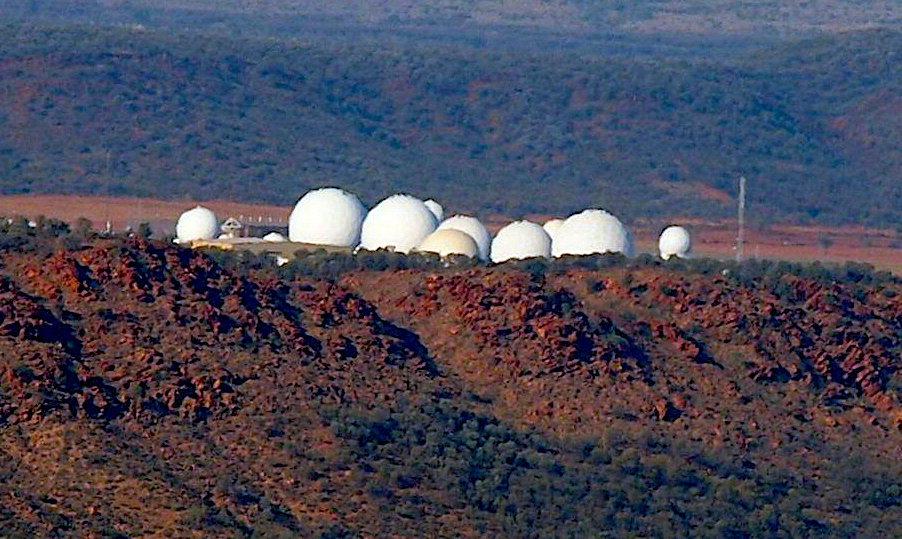
Pine Gap, a key U.S.-run listening post in Australia’s Northern Territory. (Wikipedia)
However, it is the top secret Pine Gap satellite surveillance base — officially titled “Joint Defence Facility Pine Gap” (JDFPG, but known generally to the 800 staff as “the base”) – that is Australia’s greatest contribution to the Five Eyes alliance that also includes Canada and New Zealand.
Located near Alice Springs, it’s a base for the C.I.A., National Security Agency and National Reconnaissance Office and collects signals and other data from an array of satellites snooping on military, commercial and private communication systems.
Mirrored with the N.S.A.’s base at RAF Menwith Hill in North Yorkshire, it forms a global surveillance net.
Battlefield intelligence used by the U.S. in its “war on terror” has been gathered and analyzed at Pine Gap for use by the U.S. military including in potentially illegal drone strikes in the Middle East that have killed thousands of civilians.
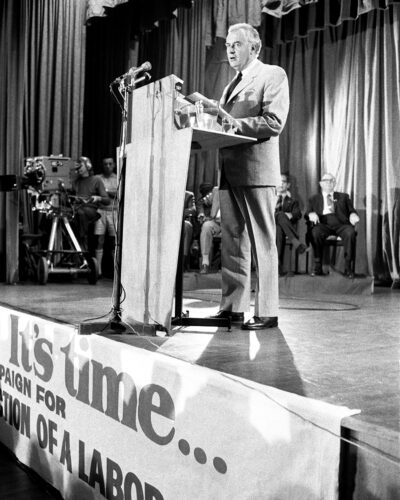
Gough Whitlam giving a speech during the 1972 election campaign. (National Archives of Australia, CC BY 4.0, Wikimedia Commons)
Pine Gap first attracted public disquiet in 1975 when the then Australian Prime Minister Gough Whitlam threatened to reveal the names of C.I.A. agents involved. He was controversially dismissed by the Queen’s representative in Australia, Governor General John Kerr, on November 11, 1975.
Last year, research by professor Jenny Hocking revealed confidential documents from the Australian National Archive that showed the advance notice that Queen Elizabeth had of the plotting by the governor general. The documents also showed a level of encouragement from senior staff of the Palace in the dismissal of the democratically elected prime minister.
At the time of the public and political controversy over Pine Gap, the site hosted just eight satellite dishes. Today, the base is quietly undergoing a new expansion with six new dishes being constructed, bringing the total now to 39.
The new dishes, most likely aimed at detecting missile launches, will boost the U.S.’s planning to fight a nuclear war with China.
Australia is tumbling headlong in accepting the rotational basing of U.S. Marines in Darwin — presently 2,500, soon expected to be 5,000 personnel. South of Darwin, near Katherine, the Tindal RAAF base is undergoing a major upgrade of refueling capability and armaments storage, to allow it to host an expanded range of allied military aircraft, including the U.S.’s long-range B-52 bombers.
Nuclear Proliferation
Australia prides itself on being a member of the “rules-based international order,” however it is cooperating with two nuclear weapons states that are breaching the Nuclear Non-Proliferation Treaty.
Britain has announced it is to increase the number of nuclear warheads it has for its Trident submarines, and together with the U.S. is developing new generation hypersonic missiles capable of delivering nuclear warheads anywhere on the globe.
Along with the U.K. and U.S., Australia is a holdout from signing or ratifying the new Treaty on the Prohibition of Nuclear War. This treaty would prohibit Australia from “provision of assistance to any State” conducting activities ranging from producing, possessing and stockpiling of nuclear weapons, through to possessing the threat to use nuclear weapons.
The Treaty requirements “to prevent and suppress” prohibited activity “on territory under its jurisdiction or control” would see a range of necessary limitations placed on Australia — including, most importantly, a review of the nuclear war-supporting functions of the Pine Gap satellite surveillance base.
War Crimes in Afghanistan

Australian soldiers on foot patrol in Uruzgan, Afghanistan, Aug. 16, 2008. (ISAF, John Collins, U.S. Navy)
The U.K. and Australia have played a key partnership role since the 9/11 attacks but have dealt with the fallout slightly differently. When the Brereton Report, an Australian-government led investigation into alleged war crimes by Australian special forces in Afghanistan, released its findings in November 2020 the results were devastating.
A four-year inquiry found that 39 Afghan civilians were murdered by Australian forces in 23 incidents in 2009, 2012 and 2013. The Kabul-based Australian photojournalist Andrew Quilty uncovered countless more killings by Australian soldiers that went unmentioned in the Brereton Report.
According to the Australian government, the Taliban takeover of Afghanistan may potentially hinder ongoing investigations into war crimes though the country is at its most relatively peaceful for decades. It’s hard not to conclude that Australian officials view the Taliban government as a convenient impediment to progressing with any prosecutions.
Nonetheless, the Brereton Report is one of the more comprehensive examinations of any Western army that occupied Afghanistan after October 2001. None of this is to defend the Australian government’s response to the report, which is filled with obfuscation, denial and willful blindness, but it’s still superior to many other comparable nations.
This is despite both Canada and New Zealand having uncovered hard evidence of their own forces committing abuses in Afghanistan and the U.S. escaping scrutiny after pressuring the International Criminal Court for years to only investigate the Taliban and ISIS.
U.S. President Donald Trump granted clemency to U.S. military personnel who killed Afghans. Fox News had encouraged Trump to pardon these men accused of war crimes.
The seriousness of the Brereton Report was reflected in comments by the Afghan-based Independent Human Rights Commission. Its chairperson, Shaharzad Akbar, said that the Australian investigation should push the U.K., U.S. and other occupation forces to examine their role in the death of civilians since 2001.
She particularly stressed that the U.K. “open an independent inquiry to review and investigate the allegation of unlawful killings by U.K. special forces.”
Instead, the British Ministry of Defence said that its “armed forces are held to the highest standards, and the Service Police have carried out extensive and independent investigations into alleged misconduct of U.K. forces in Afghanistan. As of today, none of the historical allegations under Operation Northmoor have led to prosecutions.”
Despite claiming that it was investigating serious allegations of war crimes in both Iraq and Afghanistan, Britain failed to find anyone senior worth prosecuting despite mountains of evidence. One soldier was jailed for stabbing a 10-year-old Afghan boy.
Nonetheless, cover-ups and lies were central to Whitehall’s response.
The murder of Afghan civilians was not deemed important enough nor the dogged pursuit by Saiffulah Yar who accused U.K. forces of killing four members of his family in Helmand Province in 2011.
There was important reporting by BBC Panorama and BBC Newsnight though overall the Western media has not covered itself in glory reporting the Afghan war, usually preferring government and military sources to Afghans.
Despite the Chilcot inquiry, with its damning assessment of how former Prime Minister Tony Blair pushed his country into war with Iraq, nobody has been seriously held to account for Britain’s failed wars in Iraq and Afghanistan.
The fear remains that Australia, despite the Office of the Special Investigator still investigating human rights breaches in Afghanistan, will follow London’s lead and bury or indefinitely delay any potential war crimes trials.
Elite soldier Ben Roberts-Smith is accused of killing Afghan civilians and is currently suing major Australian media reports for daring to report it. The trial has become a proxy war crimes trial while masquerading as a defamation case. It may be the only such trial in the foreseeable future.
Militarized Immigration Policy
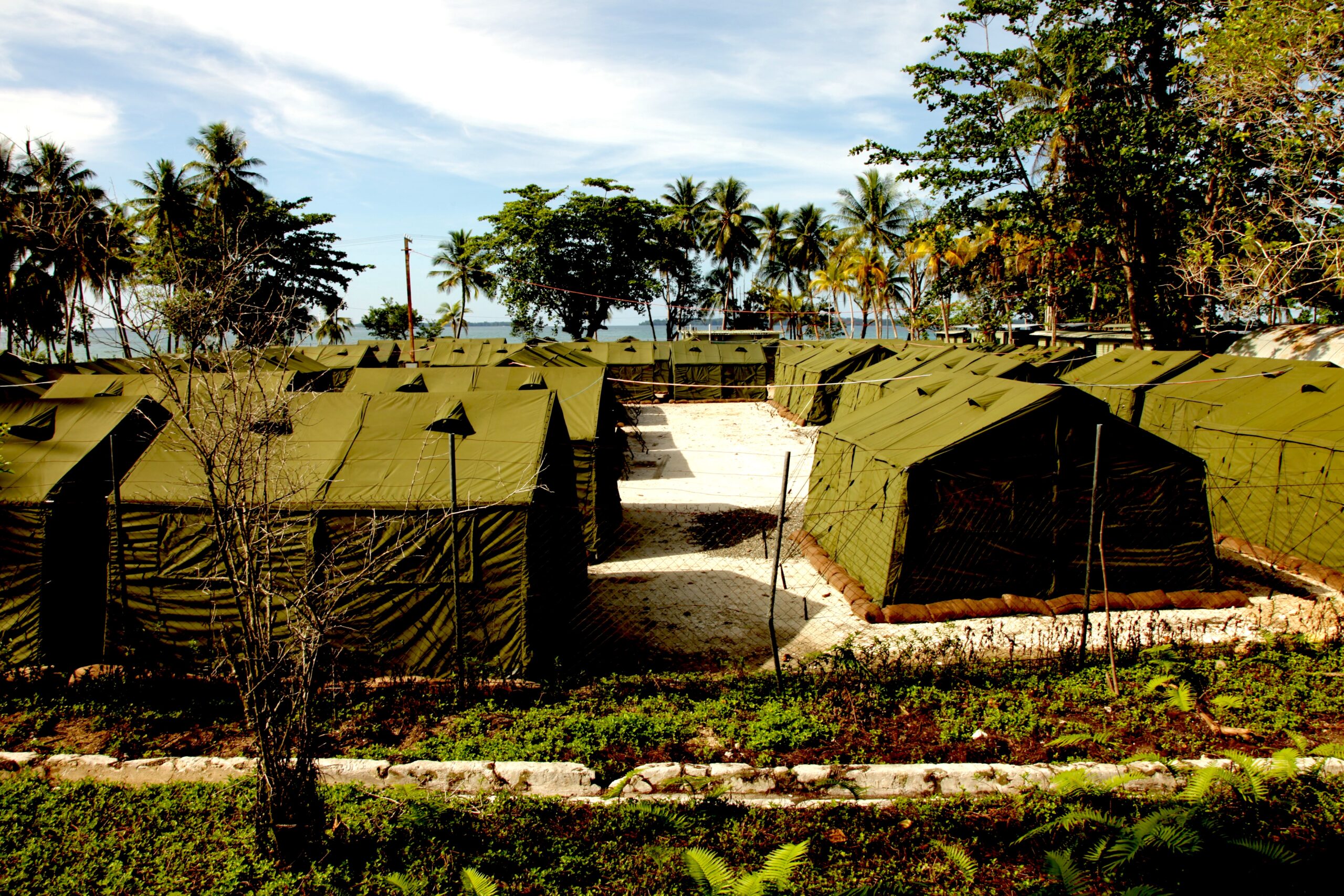
Australia’s Manus Island regional immigration processing facility, 2012. (Flickr, DIAC, CC BY 2.0, Wikimedia Commons)
It’s the militarized immigration policy where Canberra arguably inspires London the most. Australia’s immigration policy is known for its brutal disregard for human rights and sending refugees to remote Pacific Islands for processing. The policy has deep roots in Australia’s settler colonial history.
The so-called Pacific Solution began in 2001 and quickly received bi-partisan support in the Federal Parliament. Forcibly placing vulnerable refugees from Afghanistan, Iraq, Syria, Myanmar, Sri Lanka or elsewhere in overcrowded, hot and dangerous locations was a cruelly effective method of dehumanizing and silencing people, many of whom were escaping wars in countries that Australia was supposedly trying to liberate through occupation.
Despite protests from the European Union and many other liberals around the world, Australia’s refugee policy has become a model for the EU and Britain under the Conservative government.
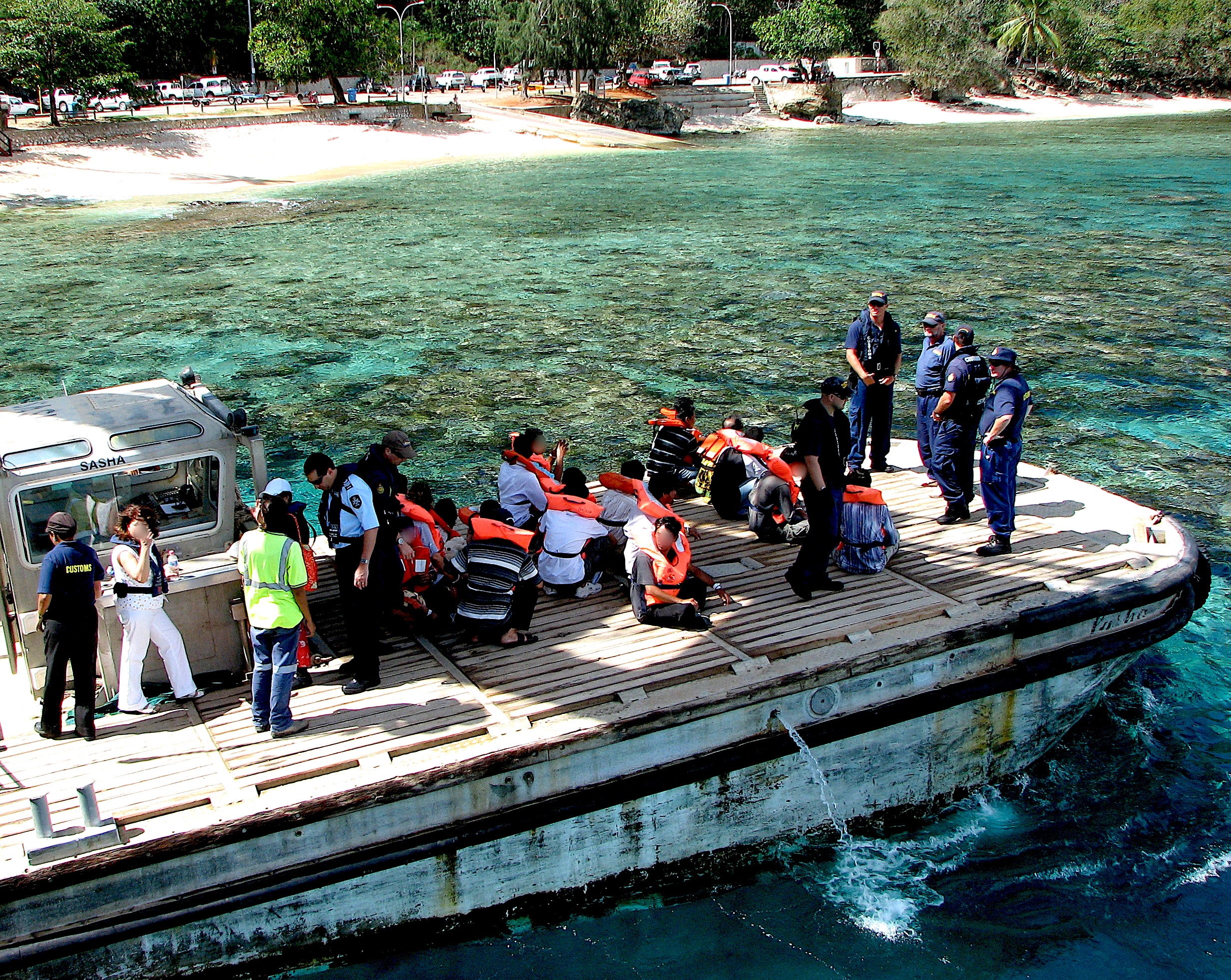
Christmas Island Immigration Detention Centre, Dec. 7, 2008. (Flickr, DIAC, CC BY 2.0, Wikimedia Commons)
Former Australian Prime Minister Tony Abbott, a right-wing climate denier, set the tone in a 2015 speech when delivering the Margaret Thatcher lecture in London by arguing that Europe should shut its borders completely. “The Australian experience proves that the only way to dissuade people seeking to come from afar is not to let them in,” he said.
The U.K. Conservatives listened and agreed. In 2020, U.K. Home Secretary Priti Patel reportedly examined the viability of constructing an asylum seeker detention facility 6,000 kilometers away from Britain, in Ascension Island or St. Helena in the South Atlantic, but eventually decided it was logistically too challenging.
Instead, in 2021 Patel announced that Britain would forcibly push back refugee boats crossing the English Channel, a carbon copy of Australia’s boat turn-back policy which the U.N. estimated in July had resulted in 800 people on 31 boats since 2013 being towed back to potential danger, sinking or death.
In some cases, Australia is credibly accused of covering up actions that led to hundreds of deaths at sea. Australia also stands accused of paying Indonesian people smugglers to keep boats out of Australian waters.
Australia and Britain share a political, ideological and military partnership that transcends partisan bickering. As journalists who have investigated this relationship for years, it’s revealing how little scrutiny is given to it by the establishment media and political elites.
Antony Loewenstein is an independent journalist, author and film-maker who has written for The Guardian, The New York Times and many others. His books include Disaster Capitalism: Making A Killing Out Of Catastrophe and Pills, Powder and Smoke: Inside The Bloody War On Drugs.
Peter Cronau is an award winning investigative journalist, writer, and film-maker. His documentary The Base: Pine Gap’s Role in US Warfighting featured on Australian ABC. He is co-editor of the recent book A Secret Australia – Revealed by the WikiLeaks Exposés.
The authors are establishing Declassified Australia as an online platform that reports on the secretive nature of Australia’s strategic relationship with the rest of the world. For updates and more information see @DeclassifiedAUS on Twitter.
This article is from Declassified UK.

What is the Aussie Poodle doing with all the Iron Ore and Coal it used to send to China ? is India getting it Cheap ?
“International Rules based Order” I’m not sure what I hate more…this phoney Washington version of imposed US Exceptionalism or the deliberate refusal of our state friendly corporate white man media to call it out for the BS that it is.
The asses of evil…
Eric Bogle wrote this song in 1971 of the young Australians cavalierly sacrificed in 1915 by their government under the sway of empire and what so cruelly became of them
And as time goes by the cruel casualties on the other side has enveloped many 100’s of thousands of non combatants too
The viciousness of the best and the brightest who craft these endless for profit wars regime change wars seems to have no bounds.
hxxps://youtu DOT be/WG48Ftsr3OI
hxxps://youtu DOT be/cnFzCmAyOp8
This kow-towing to the UK and USA by Australia has been going on for quite some time and will never end while the elected mediocrities cannot envisage an independent foreign policy.. In the 19th century Australia was involved in at least 2 wars in Africa that they had no reason to enter. Why was Australia involved in the Korean and Vietnamese conflicts. This sort of thing continues with Australian leaders with fog horn voices talking to Chinese leaders as if it was still the 19th century..